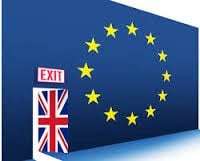The Volokh Conspiracy
Mostly law professors | Sometimes contrarian | Often libertarian | Always independent
Thoughts on Britain's vote for Brexit

Although the finally tally is not yet complete, it is now clear that Britain has voted in favor of Brexit, and will likely leave the European Union. "Leave" won by a fairly narrow margin (about 52-48), but win it did. For reasons I outlined here, I think this is a bad development, and that the British have made a significant mistake. It is also likely that the Brexit cause prevailed in part because of widespread political ignorance. At the same time, I also recognize that the pro-Brexit side had some strong arguments, particularly with regard to the EU's many ill-advised regulations, and poor decision-making on a variety of issues.
There is now a great deal of uncertainty about what happens going forward. The biggest negative consequences may be a decline in free trade and free migration in Europe, both of which might cause serious harm to large numbers of people. Almost 3 million people from other EU countries currently live in Britain, and might potentially be deported. Expelling them would both inflict considerable suffering on the migrants themselves, and severely damage the British economy. But it is also far from clear exactly what Britain's new immigration policy will be. Perhaps they will make it harder for new immigrants to enter, but let all or most of the EU migrants already in Britain stay. That would still inflict harm on potential migrants and those Britons who might have worked with them, but would be far less damaging than large-scale deportations.
There is similar uncertainty about the future of trade. Many Brexit supporters favor a deal with the EU similar to that which Norway currently has, under which free trade will continue. But it is hard to say whether the rump EU will give Britain favorable terms. It could instead try to stick it to the UK in order to deter potential departures by other nations. European Commission President Jean-Claude Juncker recently threatened that, in the event of Brexit, "the deserters will not be welcomed with open arms."
At least in the short run, I fear that Brexit represents a victory for nationalistic, xenophobic forces opposed to free trade and migration. That bodes poorly for the future, especially since xenophobic nationalist forces have made gains in other European countries, and in the US (as represented by Donald Trump's winning the Republican nomination on a platform similar to that of European far-right nationalists, such as France's National Front).
Even the continued existence of the United Kingdom itself may be in doubt. While a substantial majority of people in England voted for Brexit, a large majority of Scots voted to stay in the EU. It is possible that the Scots will now vote to secede from the UK in order to rejoin the EU. Secession was defeated in a referendum in September 2014, but still got a solid 45% of the vote. Brexit might tip Scottish opinion in the direction of independence.
Finally, the Brexit vote casts a poor light on President Obama's ill-advised threat to relegate Britain to "the back of the queue" in trade negotiations with the US, should the British leave the European Union. Although I am no fan of Brexit, it does America no good to alienate the large numbers of Britons who support leaving the EU (as it turns out, a slight majority). Whether the UK is part of the EU or not, the US has an obvious interest in promoting free trade with the British, and in generally maintaining a strong relationship with our closest ally. Hopefully, neither the current administration nor its successors will act on Obama's statement.
Perhaps it is unfair for me to criticize Obama for publicly opposing Brexit. After all, I did the same thing myself. But there is an obvious difference: I do not speak for the US government, and I did not (and could not) threaten to downgrade the US-UK relationship if the British vote the wrong way.
Be that as it may, the one thing we can be certain about at this point is that the Brexit vote will lead to a lot of uncertainty. Hopefully, the British will take full advantage of the positive aspects of independence from the EU, while minimizing the downsides as much as possible.
UPDATE: I should note that Britain is not yet officially out of the European Union. Technically, the referendum vote is not legally binding, and the UK will only leave the EU if Parliament decides to accept the vote and the government invokes Article 50 of the Treaty of European Union and completes negotiations on separation from the EU, which could take a long time. However, it seems highly likely that the government will not refuse to follow the referendum result, and will over time start the process of leaving the EU.
UPDATE #2: It is worth noting that Norway-style membership in the European Economic Area would require Britain to accept free migration for EU citizens, as well as free trade. That would greatly reduce any possible negative effects of Brexit. But continued free migration for EU citizens might well be a deal-breaker for the many British Brexit supporters, one of whose principal reasons for leaving the EU was precisely the desire to greatly reduce immigration from the rest of Europe.


Show Comments (0)